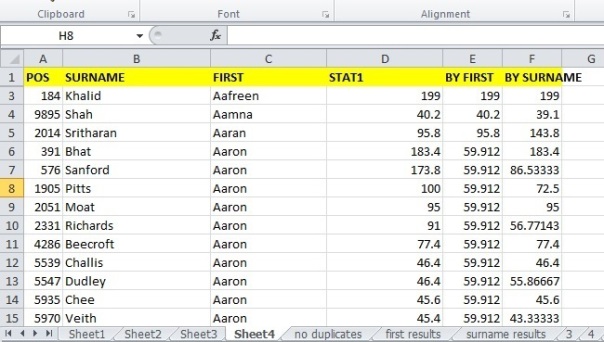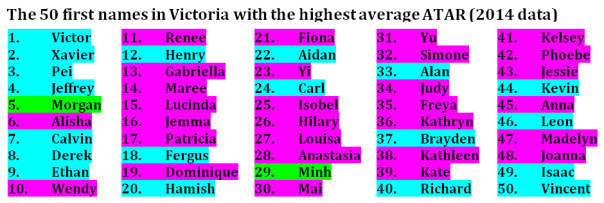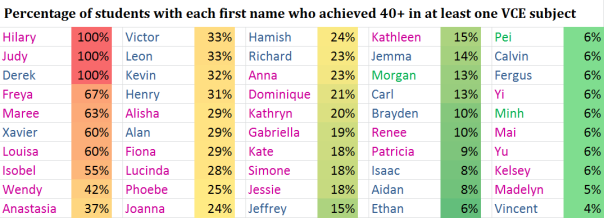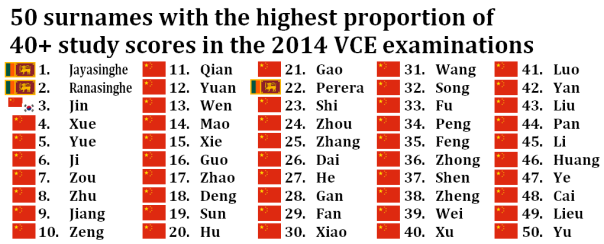
I’m excited to say that my wife and I are expecting our first baby in November: we’re expecting her to be born shortly after the VCE Chemistry examination! Like most new parents, I’ve been pondering baby names in the last few weeks. In particular, I’ve been looking for a girl’s name that’s traditional, popular and sounds intelligent.
The first two criteria are easy to satisfy: we can look to the Royal Family for traditional names; and the most popular baby names of 2015 are just one Google search away. However, the third criterion is a bit more difficult: what’s the most intelligent girls’ name? With this question in mind, I set out to find the most intelligent first name in Victoria based on empirical evidence from three publicly available databases.
Method: combine three public databases
I downloaded the list of 40+ VCE study scores for 2014 from the Herald Sun’s website. I cleaned the database using Microsoft Excel and obtained a neat, searchable list of 13,478 students and their VCE results that looked like this:

I removed outliers by deleting all the rare names from the list. Only names with 5 or more high achievers (40+) were included in the final analyses. Admittedly, this removed most Chinese students from the database because they have very unique first names, but I’ll expand on the implications of this later.
I then merged this database with the list of surnames and their prevalences that I obtained from IP Australia, and a similar list of first names from the NSW Government website. Now, I could query my database with interesting questions such as, “Which first name got the highest average ATAR in 2014?” and “Which surnames had the highest proportion of 40+ study scores?” The results were fascinating, and will be of some help when deciding a name for a newborn baby.
Results
Table 1: Students called “Victor” achieved the highest mean ATAR in 2014

The ATARs of students called Victor were far higher than the ATARs of students with any other first name. (Is that because we live in Victoria?) I’ve coloured the names blue, pink or green to represent whether the names are male, female or both.
Table 2: Hilary, Judy and Derek had the highest proportion of 40+ study scores in 2014
I added some more columns to the spreadsheet to estimate what percentage of students born with those 50 first names in 1997 in Victoria achieved a 40+ study score in at least one subject. According to my estimates, every student called Hilary, Judy or Derek achieved at least one study score of 40 or above in their 2014 VCE examinations. Correct me if I’m wrong.

Where are all the Asian names? I mentioned earlier that I removed all the rare names to eliminate outliers from the database. (This is standard practice.) The vast Chinese character set gives rise to literally millions of possible first names, which means that many Chinese students have unique first names and most of them were therefore excluded from my previous analysis. For a truer reflection of the influence of Chinese-background students in VCE, we need to look at students’ surnames instead.
“…every student called Hilary, Judy or Derek achieved at least one study score of 40 or above in their 2014 VCE examinations.”
Table 3: Students with the surname “D’Souza” achieved the highest mean ATAR in 2014
I re-ordered the list of 13,478 students to show the mean ATAR for each surname. Surprisingly, the highest achieving surname was D’Souza, which was originally Portuguese but is now found worldwide. According to Wikipedia, “A prominent family carrying the spelling de Sousa emigrated from Portugal to Goa during mid 1956 before leaving to Hong Kong. This was followed by a third relocation in the mid 1960s, where they now reside in Melbourne, Australia. The family donated their property in Hong Kong to Franciscan nuns.” Their success in Melbourne continues to this day.

Chinese surnames dominated the rest of the top 50. The second-place surname, Chin, for example, comes from Qin Shi Huang, the first ever Emperor of China. He was born in 269 BC and is still regarded as one of the boldest emperors in Chinese history. It’s also believed that the English name for ‘China’ was derived from Emperor Qin Shi Huang’s name.
A few English, Korean, Irish and Vietnamese surnames also made it into the top 50. Kennedy was 273rd out of 379 surnames.
Table 4: Chinese surnames dominate 40+ study scores
An ATAR is an aggregate score of 4 to 6 subjects including English and (usually) Maths, and thus provides an indication of how well-rounded a student is academically. Next, instead of finding lists of well-rounded students, I wanted to find out which students excelled in just one or more subject. I chose study scores of 40 or above as a benchmark. I then divided the number of students with each surname who achieved at least one study score of 40+ by the number of people in Victoria who had that surname. The result is a fairer indication of which students excelled in one or more area, but didn’t necessarily excel in all subjects. The results were fascinating!

Three Sri Lankan surnames and 47 Chinese surnames dominated the top 50. Interestingly, an estimated 23% and 22% of students surnamed Jayasinghe and Ranasinghe achieved a study score of 40+, respectively, which is many times higher than the VCE student population as a whole.
Conclusion: Names Matter!
Evidence has shown that boys who are given girls’ names (e.g. “Sue”) are far more likely to exhibit poor behaviour and low academic outcomes than their peers with more appropriate, boy-ish names. . A study involving 5,000 job applications revealed that applicants with “Black-sounding” names like Lakisha and Jamal were 33% less likely to land a job interview than their equally-qualified counterparts with “White-sounding” names such as Emily and Greg. In South Carolina, Patrick McLaughlin presented evidence to support the Portia Hypothesis, in which women with masculine-sounding names were more likely to succeed in the legal profession than an otherwise-identical counterpart.
Exactly how much do names matter? To what extent does a name determine your destiny? Let me know in the comments section below.
I think that the most important is the meaning of a name. F.ex. mine means “wisdom” so it motivates me to gain knowledge and just to prove I’m worth this ancient name 🙂
LikeLike
Of course. Name meanings are important as well! I really like the name, Sophia, actually!
LikeLike
Congratulations on your exciting news. I am sure you will love teaching Chemistry to your first born child in future. With best wishes.
LikeLike
Thanks!
LikeLike
“Conclusion: Names Matter!” > Oh dear! You made the classic mistake – correlation does not equal causation. Maybe the children with successful names come from successful families, with above average intelligent parents? These parents are less likely to name their children after clothing brands, pop-stars, soap opera actors or actresses? Your research above is essentially propagating this trend, consider a hypothetical family on a low income, with parents who left high school at the earliest possible age – they’re unlikely to be building a spreadsheet like yours, and may well be less likely to care about names that are “traditional, popular and sound intelligent.”!
I’m feel there might be something in it, but not sure the above gives evidence that the name matters; unless of course teachers (and employers) are prejudiced and spend more time and effort with the kids with “smart” names?
LikeLike
You’re absolutely right about the first names. I’ve pointed out an interesting correlation but this doesn’t explain the causation (if any) involved.
Surnames, however, are different. People don’t choose their surnames – and they especially don’t choose voluntarily to adopt surnames from other cultures (like Wen, Zhang or Huang). Why, then, do Chinese-surnamed students perform so much better in “one or more subjects”? There’s clearly some causation there.
If I re-process the dataset, I could find out exactly which subjects those Chinese-surnamed students excelled in… that might be the topic of a future post!
LikeLike
I’m turning into a serial pedant, but we’re a family who only one generation ago changed their name from Smith to Cunningham. My father and three uncles all had professional jobs (2 x accountants, 1 x loss adjuster, 1 x professor of Science), now I need to find out what their father did – might be some evidence right there!
LikeLike
Actually over here in Sweden, it is very common and not unheard of for a man to even take on his wife’s family name, or even hyphenate the names. First names here are quite often hyphenated, but I’m not sure why. My Father-In-Law’s first name was Per-Olof and a friend of ours is named Sven-Olof. My wife’s brother took his mother’s maiden name. So he gave up Larson (dad’s name) to Renberg (mother’s name).
LikeLike
Reblogged this on milanioliva/ olivera kovacevic jankovic.
LikeLike
I love it if people would not name their children with Flower names, Tree names dominate, Ash, Elm, and finally my kid Oak. I think some names have gone out of business, where is Pork Chop, for a Chinese Kid, Lamb Chop for an English girl, Medium Rare for a brat in Philly, Munster for a sticky child in France, Petite for a girl in Italy.
LikeLike